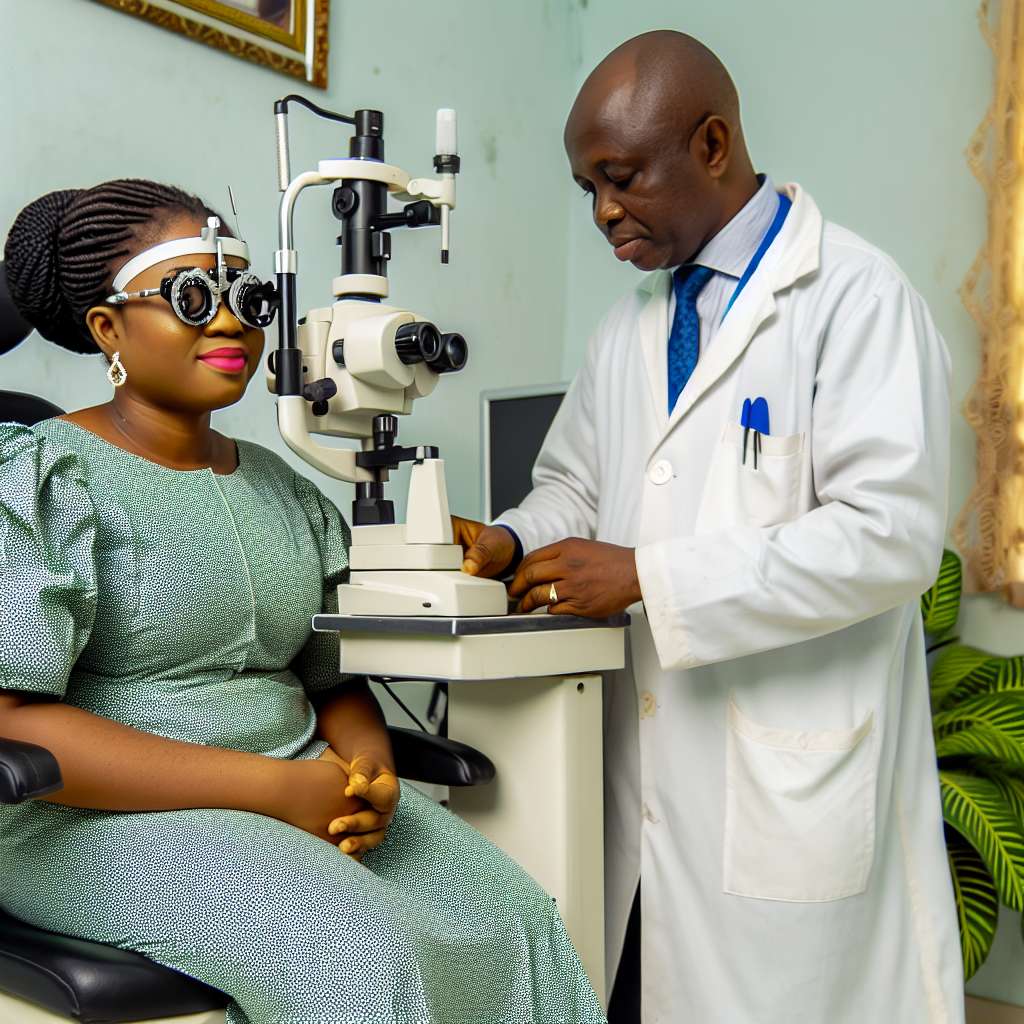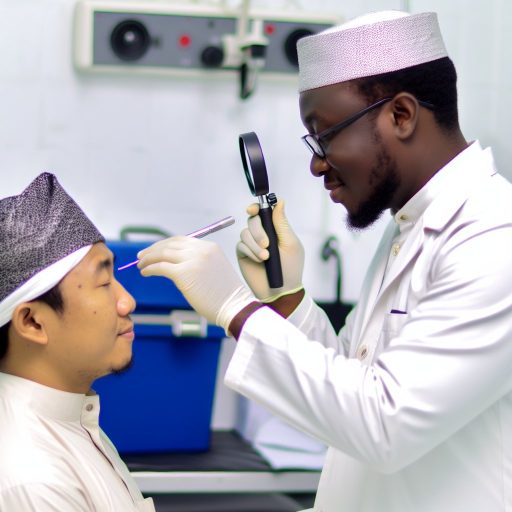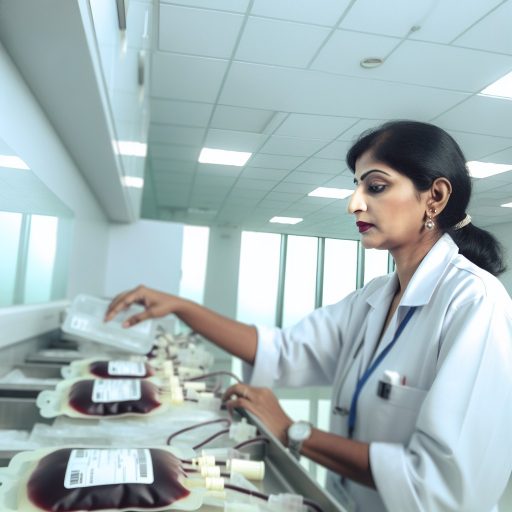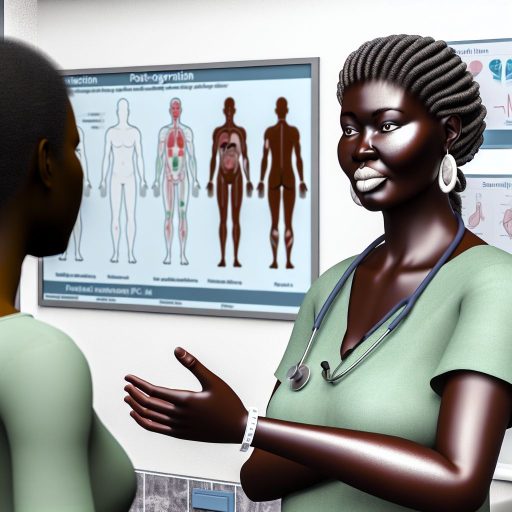Introduction
Ophthalmology in Nigeria is a vital medical specialty focused on eye health.
The field plays a crucial role in diagnosing and treating a wide range of eye conditions to prevent blindness.
Government and private support are essential for the growth and advancement of ophthalmology in Nigeria.
This support can help improve the quality of eye care services, increase access to treatment, and enhance training opportunities for eye care professionals.
Government support for ophthalmology in Nigeria
The Nigerian government has shown a commitment to supporting ophthalmology through the funding of various eye care programs.
This financial support is crucial in ensuring that eye health services are accessible to all Nigerians, regardless of their socio-economic status.
By investing in eye care programs, the government is not only promoting good vision health but also reducing the burden of preventable blindness in the country.
Funding for eye care programs
In addition to funding eye care programs, the government also prioritizes the training and capacity-building of ophthalmologists in Nigeria.
Through initiatives like scholarships, fellowships, and training programs, the government is working to improve the skills and knowledge of eye care professionals in the country.
This investment in human resources is essential for enhancing the quality of eye health services and addressing the growing demand for ophthalmic care.
Training and capacity building for ophthalmologists
Furthermore, the Nigerian government has implemented policies and regulations aimed at improving eye health services in the country.
These regulations focus on various aspects of eye care, including standards of practice, equipment requirements, and patient safety.
By enforcing these policies, the government ensures that eye health services in Nigeria adhere to international standards and are delivered in a safe and efficient manner.
Policies and regulations to improve eye health services
Government support for ophthalmology in Nigeria is multifaceted, encompassing funding for eye care programs, training and capacity-building for ophthalmologists, and the implementation of policies and regulations to improve eye health services.
These initiatives demonstrate the government’s commitment to promoting good vision health and reducing the burden of preventable blindness in the country.
When it comes to government support for ophthalmology in Nigeria, there are several challenges that need to be addressed in order to improve eye care services for the population.
Challenges Faced by Government Support
One of the major challenges faced by government support for ophthalmology in Nigeria is the limited budget allocation for eye care.
The government allocates a small portion of the overall healthcare budget to eye care services, which results in a lack of funds for essential equipment, training, and treatment facilities.
Additionally, there is a severe lack of infrastructure and resources for ophthalmology in Nigeria.
Many eye care facilities in the country lack the necessary equipment and trained staff to provide quality care to patients.
This lack of resources hinders the ability of the government to effectively address eye health issues in the population.
Moreover, bureaucratic challenges pose a significant obstacle to the implementation of government programs aimed at improving eye care services.
The complex administrative procedures and slow decision-making processes within government agencies can delay the rollout of important initiatives and prevent timely access to eye care for those in need.
Strategies to Overcome These Challenges
- Advocating for increased budget allocation for eye care services
- Securing funding from international organizations and donors
- Investing in training programs to build the capacity of eye care professionals
- Improving infrastructure by building and equipping new eye care facilities
- Streamlining bureaucratic processes to ensure timely implementation of programs
In order to address the challenges faced by government support for ophthalmology in Nigeria, it is essential for all stakeholders, including the government, healthcare providers, and civil society organizations, to work together towards improving eye care services in the country.
By advocating for increased budget allocation, securing additional funding, investing in training programs, improving infrastructure, and streamlining bureaucratic processes, significant progress can be made in addressing eye health issues and providing quality care to all Nigerians.
Gain More Insights: Voice and Throat Surgeries: Options in Nigeria
Private sector involvement in ophthalmology in Nigeria
The private sector plays a significant role in supporting ophthalmology services in Nigeria.
By engaging in corporate social responsibility initiatives, partnering with NGOs and international organizations, and providing eye care services in private hospitals and clinics, the private sector contributes to improving access to eye care for Nigerians.
Corporate social responsibility initiatives
Many companies in Nigeria have recognized the importance of supporting ophthalmology services as part of their corporate social responsibility efforts.
This includes funding eye care programs, providing medical equipment, and sponsoring outreach programs to remote communities.
Private hospitals and clinics offering eye care services
Private hospitals and clinics in Nigeria play a crucial role in providing eye care services to individuals who may not have access to public healthcare facilities.
These facilities often have state-of-the-art equipment and skilled ophthalmologists who can diagnose and treat various eye conditions.
Partnerships with NGOs and international organizations
The private sector frequently collaborates with non-governmental organizations (NGOs) and international organizations to enhance the reach and impact of ophthalmology services.
These partnerships help distribute resources, knowledge, and expertise to areas in need, ultimately improving eye care outcomes in Nigeria.
Learn More: Anaesthesiology Career Pathways in Nigeria
Private sector support plays a crucial role in improving ophthalmology services in Nigeria.
Impact of private sector support:
- Increased access to eye care services for underserved populations: Private sector investment in ophthalmology has led to the establishment of eye care facilities in remote areas, providing essential services to underserved communities.
- Technology advancements in eye care: Private sector involvement has facilitated the adoption of cutting-edge technologies in diagnosing and treating eye conditions, enhancing the quality of care provided.
- Contribution to reducing blindness and visual impairments in Nigeria: Private sector support has significantly contributed to efforts aimed at reducing the prevalence of blindness and visual impairments in the country.
The collaboration between the government and the private sector in advancing ophthalmology services in Nigeria has proven to be highly beneficial.
This partnership has had positive impacts on accessibility, technology adoption, and the reduction of blindness and visual impairments.
You Might Also Like: Scope of Biomedical Technology in Nigeria’s Healthcare

Collaboration between government and private sector
The collaboration between the government and the private sector in Ophthalmology in Nigeria is crucial for the improvement of eye health services in the country.
Transform Your Career with Expert Guidance
Get personalized mentorship consulting that’s tailored to your unique path. Our expert advice is actionable and exclusive.
Get StartedThis partnership allows for the pooling of resources, expertise, and funding to address the growing need for quality eye care services.
Joint initiatives and projects in eye health
Both the government and the private sector have launched joint initiatives and projects aimed at improving eye health outcomes in Nigeria.
These initiatives include the establishment of eye care centers, training programs for eye care professionals, and awareness campaigns to educate the public about the importance of eye health.
Public-private partnerships for sustainable eye care programs
Public-private partnerships are essential for the sustainability of eye care programs in Nigeria.
By working together, both sectors can leverage their strengths and resources to ensure the continued availability of quality eye care services for all Nigerians.
These partnerships also help in ensuring that eye care services are affordable and accessible to the general population.
Sharing of resources and expertise to strengthen the field
The sharing of resources and expertise between the government and the private sector is key to strengthening the field of Ophthalmology in Nigeria.
The government can provide funding, infrastructure, and oversight, while the private sector can contribute innovative solutions, technology, and specialized skills to enhance the delivery of eye care services.
Gain More Insights: Radiography and Digital Imaging in Nigeria
Importance of Government and Private Support for Ophthalmology in Nigeria
Recap of the importance of government and private support for ophthalmology in Nigeria:
Government and private sector partnerships are crucial for advancing eye health services in Nigeria.
These collaborations can help in the development of infrastructure, training of healthcare personnel, and provision of quality eye care services.
By working together, both sectors can address the growing burden of eye diseases in the country.
Call to Action for Increased Collaboration and Investment in Eye Health Services in the Country
It is imperative that the government and private sector continue to support ophthalmology services in Nigeria.
Increased investment in eye health will lead to improved access to care and better outcomes for patients.
We urge stakeholders to come together, pool resources, and prioritize eye health to ensure a brighter future for all Nigerians.
Additional Resources
MUIDEEN LASISI – Chief Consultant Ophthalmologist – Kubwa …
Profiling and factors associated with glaucoma diagnostic practice in …




